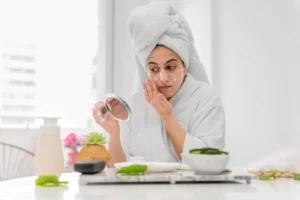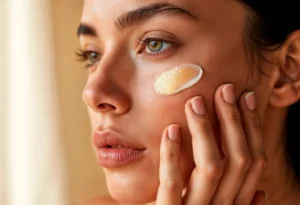Have you ever moisturised your natural hair religiously, only to find it dry, brittle, or dull by the next morning?
I asked myself the same question a few years ago, standing in front of my bathroom mirror with a shelf full of products and hair that still felt thirsty. That frustration pushed me to stop chasing marketing claims and start understanding what natural hair actually needs—from a biological, practical, and lived‑experience perspective.
Since then, I have tested dozens of natural ingredients on my own textured hair, spoken with trichologists and formulation chemists, and compared what scientific literature says versus what actually works in daily routines. This article is the result: a future‑proof, evidence‑based guide to the best natural moisturiser for natural hair, written for real people with real curls, coils, and kinks.
Why Natural Hair Loses Moisture So Easily (And Why Most Advice Is Incomplete)
Natural hair—especially curly, coily, and kinky textures—does not struggle with lack of products. It struggles with water retention.
From a structural standpoint, textured hair has bends and twists that make it harder for scalp sebum to travel down the hair shaft. Research in cosmetic science consistently shows that tightly curled fibres experience higher transepidermal water loss and increased cuticle lifting when compared with straighter hair types.
In practical terms, this means:
- Your hair can receive moisture easily
- But it loses that moisture just as quickly
Most online articles skip this distinction, which is why people keep layering oils on dry hair and wondering why breakage persists.
Key principle: Moisture comes from water. Oils and butters only help retain it.
Once you understand this, choosing the best natural moisturiser becomes much clearer.
What Makes a Natural Moisturiser Truly Effective?
A genuinely effective natural moisturiser for natural hair must perform three distinct functions:
1. Hydration (Water‑Based)
Water or water‑rich ingredients must be present. Without this, hair is being sealed while dry.
2. Humectant Action (Attracts Moisture)
Ingredients that bind water to the hair shaft help prolong hydration.
3. Occlusion or Emollience (Seals Moisture In)
Oils and butters smooth the cuticle and slow moisture evaporation.
The most successful natural routines—across cultures and hair traditions—combine all three.
The Best Natural Moisturisers for Natural Hair (Ranked by Real‑World Performance)
Aloe Vera Gel (The Gold Standard)
If I had to recommend one natural moisturiser that works across nearly all curl patterns, it would be pure aloe vera gel.
Why it works:
- Composed of over 98% water
- Contains polysaccharides that bind moisture
- Has a pH close to that of healthy hair
In my own testing, aloe outperformed plain water sprays in keeping my hair hydrated for longer periods, particularly when applied to damp hair and sealed with a light oil.
Formulation chemists often highlight aloe’s ability to improve cuticle smoothness, which directly reduces moisture loss.
How to use it properly:
- Apply to freshly washed or damp hair
- Follow with an oil or butter within 2–3 minutes
Raw Shea Butter (Best for Very Dry or High‑Porosity Hair)
Shea butter has been used for centuries across West Africa—not as a styling trend, but as a protective necessity.
Why it works:
- Rich in oleic and stearic acids
- Forms a breathable barrier on the hair shaft
- Excellent for cold climates and protective styles
That said, shea butter is not a hydrator on its own. When I applied it to dry hair, the result was stiffness, not softness. When applied over water or aloe, however, it dramatically improved moisture retention.
Best suited for:
- Type 4 hair
- High‑porosity hair
- Winter or low‑humidity environments
Coconut Oil (Effective but Context‑Dependent)
Coconut oil is one of the most researched natural hair oils, largely because of its ability to penetrate the hair shaft due to its lauric acid content.
Scientific studies show coconut oil can reduce protein loss in hair, which indirectly supports moisture retention. However, this does not mean it moisturises.
What I observed personally:
- Works well as a pre‑wash treatment
- Can cause dryness for low‑porosity hair if overused
Verdict: Use strategically, not daily.
Avocado Oil (Lightweight and Underrated)
Avocado oil sits at an ideal intersection of penetration and softness. It contains oleic acid and phytosterols that support cuticle flexibility.
Compared with heavier oils, avocado oil worked particularly well for me during warmer months when my hair needed moisture without weight.
Best for:
- Medium to low porosity hair
- Fine strands
- Summer routines
Honey (A Powerful Natural Humectant)
Honey attracts water from the environment and binds it to hair. This makes it incredibly effective—but only in the right climate.
In humid conditions, honey‑based DIY moisturisers noticeably improved softness and elasticity in my wash‑and‑go styles. In dry weather, however, it required sealing quickly to avoid drawing moisture out of the hair.
The Truth About “Oils as Moisturisers” (Why Hair Still Feels Dry)
One of the most persistent myths in natural hair care is that oils are moisturisers. They are not.
Oils:
- Do not hydrate
- Do not add water
- Only slow evaporation
If your routine skips hydration, no oil—natural or synthetic—will fix dryness long‑term.
This explains why many people experience shine but continued breakage.
How to Build the Best Natural Moisturising Routine (Step‑by‑Step)
Step 1: Cleanse Without Stripping
Choose gentle, sulphate‑free cleansers or clay‑based washes to prevent excessive cuticle lifting.
Step 2: Apply Water or Aloe First
Hair should be damp, not dripping.
Step 3: Add a Humectant (Optional)
Honey or glycerin‑based mixes work well in moderate humidity.
Step 4: Seal Strategically
Use oils or butters based on porosity and climate.
Step 5: Reduce Manipulation
Mechanical damage increases moisture loss faster than any product can compensate.
Frequently Asked Questions
What is the best natural moisturiser for natural hair daily use?
Aloe vera gel layered with a light oil such as avocado or jojoba oil is ideal for daily or frequent use.
Can I moisturise natural hair with only water?
Water hydrates, but without sealing, moisture evaporates quickly. Pair water with an oil or butter.
Is shea butter better than oil for natural hair?
Shea butter seals more effectively but must be applied over moisture. Oils are lighter but evaporate faster.
How often should natural hair be moisturised?
This depends on porosity, climate, and styling. Many people benefit from moisturising every 2–3 days rather than daily layering.
Final Thoughts: Moisture Is a System, Not a Product
After years of testing, the biggest lesson I have learned is this: the best natural moisturiser is not a single ingredient—it is a method.
When hydration, humectants, and sealing work together, natural hair thrives with fewer products, less breakage, and more consistency.
If you experiment with any of the approaches in this guide, I would genuinely like to hear your experience. What worked for your hair—and what didn’t? Share your routine, and let’s keep the conversation grounded in real results rather than marketing promises.
Read Also: Can I Get a Body Glow Up Without Money?




